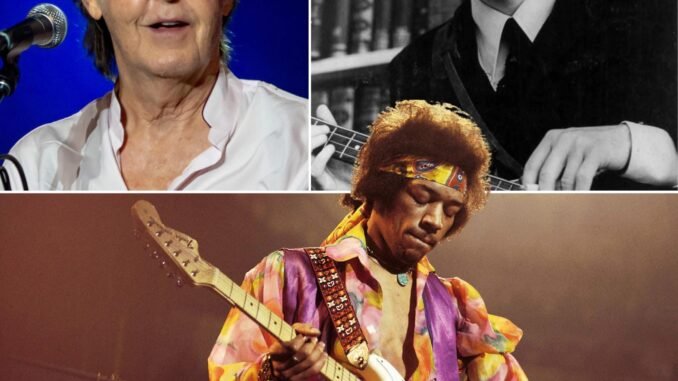
When Paul McCartney Looked Up
Before the world called him a Beatle, Paul McCartney was just another dreamer in Liverpool—a wide‑eyed teenager with a second‑hand guitar and a head full of songs. He wasn’t thinking about revolutions in bass playing or world‑spanning fame. He was thinking about fire. About flash. About the way a six‑string could cut through the night like a comet.
In the cramped back rooms of Liverpool’s houses, he strummed until his fingers ached, listening to crackling records of the American rockers who lit up his imagination. His hero wasn’t some low‑end sideman. It was Eddie Cochran, the electrifying showman who made his guitar snarl and wail with swagger. Cochran’s slicked‑back hair, sharp clothes, and effortless command of his instrument seemed like the blueprint for freedom itself. Young Paul studied every lick, every chord, every bit of attitude, hoping that someday he could command a stage with the same raw brilliance.
Back then, bass guitars weren’t glamorous. They didn’t howl; they hummed. They didn’t set the crowd alight; they held the band together. And Paul? He never set out to hold down the low end. He wanted the solos. He wanted the spotlight.
But fate, as it often does, had a different plan.
The Bass Found Him
When the early Beatles were still a scrappy bar band, lineup changes left a vacancy. Someone had to pick up the bass. McCartney hesitated. In his mind, switching from guitar to bass was like stepping out of the sun and into the shadows. But bands survive on compromise and chemistry, and so he slung a bass over his shoulder.
Then something unexpected happened.
He didn’t just play the bass. He reinvented it.
Paul approached the instrument with the mind of a guitarist and the curiosity of a composer. He turned the bassline into a melody, weaving it around the guitars instead of hiding beneath them. Songs like “Something,” “Paperback Writer,” and “Rain” showed how far he could push that low end, making it sing, making it dance. The bass became his voice—different from the one he originally imagined, but every bit as vital.
Yet, even as he carved out a place as one of the most innovative bassists in history, McCartney never lost his deep love for the guitar or for those who dared to push its boundaries. His admiration for players who lit up the fretboard never dimmed.
Enter Jimi Hendrix
In June 1967, the world had just been shaken by a new Beatles record: Sgt. Pepper’s Lonely Hearts Club Band. Its kaleidoscopic sounds were everywhere, heralding a new chapter in rock history. Just days after the album’s release, McCartney found himself in London, in the audience at a small club, ready to see the talk of the town: a young American guitarist named Jimi Hendrix.
Hendrix had been making waves with his otherworldly technique—feedback sculpted into art, wah‑wah wails that seemed to come from some distant planet. Paul knew he was in for something special. He didn’t know he was about to witness history.
The band took the stage, Hendrix in his military jacket, guitar slung low like a weapon. Without preamble, he launched into the opening chords of Sgt. Pepper’s Lonely Hearts Club Band. The album had been out for barely three days, yet here was Hendrix, not just playing it, but owning it, bending it into his own psychedelic language.
McCartney’s jaw dropped. Around him, the London crowd gasped and cheered, stunned by the audacity. Hendrix’s guitar screamed and sighed, twisting familiar melodies into something dangerous and new. The notes spiraled upward, set free from gravity, and for a few minutes the whole room seemed to hover.
A Moment of Awe
For Paul McCartney, that night wasn’t about competition or ego. It wasn’t about charts, sales, or fame. It was about something purer: the thrill of watching someone transcend the instrument you love. As Hendrix played, Paul felt the same wide‑eyed wonder he’d known back in Liverpool with his battered guitar. Here was a musician taking risks, burning with imagination, chasing the very spirit of rock and roll.
Later, McCartney would describe the moment with reverence. Seeing Hendrix tear into the Beatles’ masterpiece so soon after its release wasn’t an insult—it was the highest compliment imaginable. “It’s like you’ve been paid the greatest tribute,” he once said, “from one musician to another.”
It’s easy to think of legends as separate peaks on distant mountains. But that night in London proved something else: even legends look up. Even icons feel awe. McCartney, whose songs would change the sound of a generation, stood in that crowd humbled, inspired, renewed.
Legacy Beyond Strings
Decades later, McCartney still speaks of Hendrix with a smile, still recalls the electricity in the air that night. It’s a reminder that artistry isn’t a race—it’s a conversation. A dialogue between players and songs, between past and future. McCartney might have made the bass guitar sing in ways no one expected, but at his core, he remained a guitarist at heart, forever chasing that same magic.
And maybe that’s what keeps music alive.
Not just the fame, not the records sold, but those moments when one artist sees another reach for the impossible—and, for a second, grabs hold of it.
When Hendrix bent those notes into the London night, Paul McCartney felt something more than admiration. He felt connected, reminded of a kid in Liverpool staring at an Eddie Cochran record and daring to dream. The circle had closed, only to open again.
Because in the end, when a legend looks up to another, it’s no longer about instruments or spotlights. It’s about the fire that unites them.
It’s about shared brilliance.
And Paul never forgot that night.
Leave a Reply